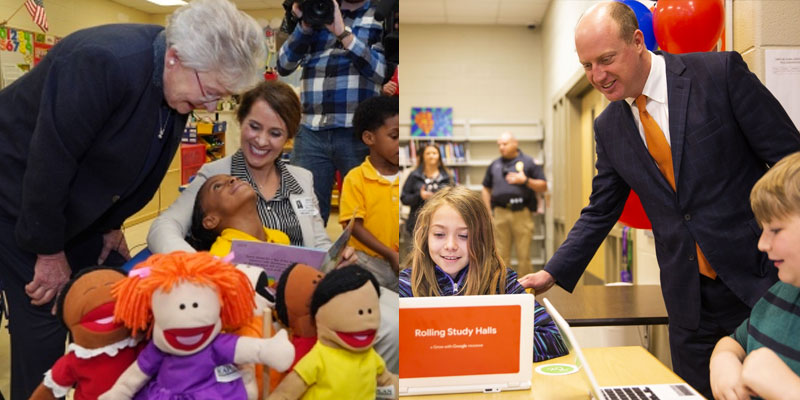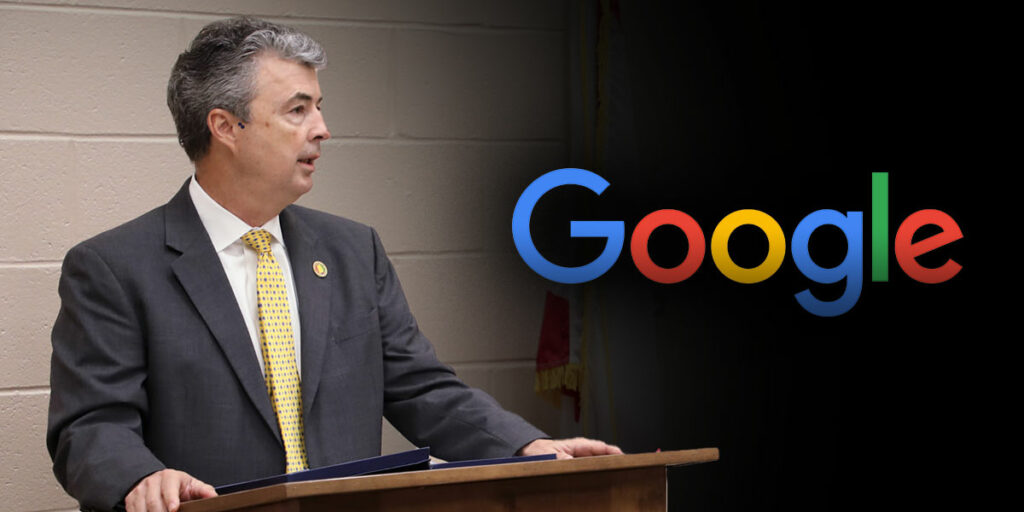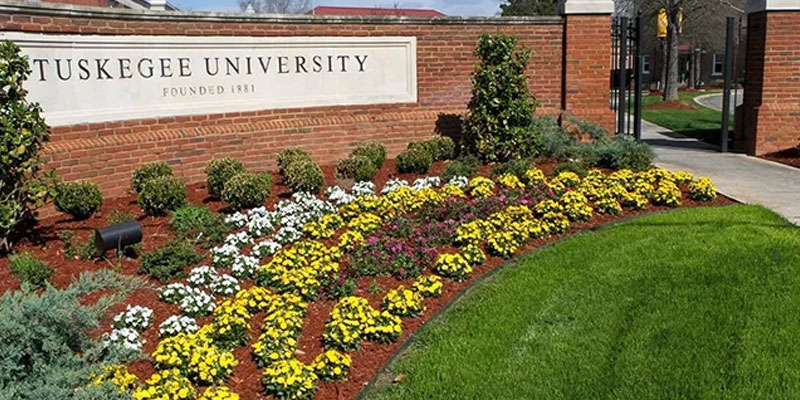Governor Kay Ivey and Lt. Governor Will Ainsworth are using their respective positions to put Alabama students in prime position to compete in the evolving modern workforce.
Friday, Ainsworth joined Google, State Sen. Jim McClendon (R-Springville) and leaders from the local school board at an event in Talladega County, celebrating the launch of Google’s Rolling Study Halls program – an upstart initiative that brings Wi-Fi to students with long commutes in 16 rural communities across America.
Through this revolutionary program, Google provides each school district with Wi-Fi, computers and onboard educators for the school buses. The initiative, which was launched at Talladega County’s Munford Middle School at the beginning of the fall 2018 semester, helps students nationwide reclaim more than 1.5 million hours of learning time that would otherwise be lost during long bus commutes.
“Innovative programs like the Google Wi-Fi school buses are allowing us to provide our public school students with the 21st Century educations that they will need to compete in the global economy,” Ainsworth said in a statement. “Preparing the students of today for the workforce of tomorrow will ensure that Alabama’s economy remains strong and our state’s employment rates continue to set records well into the future.”
For our students to be prepared to succeed in the workforce of tomorrow, our education system must be innovative. Partnering with Google, Talladega County schools are teaching students coding and even provide WiFi on their bus ride home. Thanks @Google for being a great partner! pic.twitter.com/P1XILoPIcR
— Will Ainsworth (@willainsworthAL) March 15, 2019
According to American Enterprise Institute (AEI), one out of every four U.S. students today are educated in schools defined as rural, which means that more than 10 million students may not have reliable access to an internet connection at home for schoolwork. In partnership with the Consortium for School Networking (CoSN), Google is working closely with districts to start closing that homework gap for thousands of students across the country.
“Talladega County is proud to help lead the country in finding innovative ways to make sure students everywhere have the tools they need to succeed at the highest levels. Google’s Rolling Study Halls is something we know will benefit the students of Munford, and help them create the next big thing right here in Alabama,” McClendon added.
Great news for the small community of Munford ❗️ With technology continuously evolving & the demands of the global economy growing, it’s vital our students have the best resources at their fingertips. This @Google program is doing just that — glad to see it coming to Alabama. https://t.co/qB1oTQfakY
— Governor Kay Ivey (@GovernorKayIvey) March 15, 2019
This comes after Ainsworth recently helped highlight another cutting-edge educational program that is set to take-off in the state: Curriculum Associates’ i-Ready.
‘Today’s students need an education and experiences that will prepare them for the jobs of the future’
On the same day as the Google event, Ivey encouraged young women in Alabama high schools to take advantage of an opportunity to explore their aptitude for cybersecurity and computer science by trying to solve the challenges of the 2019 “Girls Go CyberStart” program.
“Technology is transforming every sector of Alabama’s workforce, and today’s students need an education and experiences that will prepare them for the jobs of the future,” the governor said in a statement. “These CyberStart competitions are fun ways for young women and men to explore and learn about the high-tech, high-impact field of cybersecurity.”
Participating students – and their teachers – do not need knowledge or experience in information technology or cybersecurity to participate. All that is required is a computer and an Internet connection. The program is free for schools and students.
Students will also have the opportunity to win cash prizes for themselves and their schools. In Alabama, at least 10 high school girls will each get $500 scholarships to help them pay for college.
Participants use the CyberStart Game, an online series of challenges that allow students to act as cyber protection agents to solve cybersecurity-related puzzles and explore exciting, relevant topics such as cryptography and digital forensics. Yellowhammer State high schools where at least five girls in the Girls Go CyberStart Program master six or more of the challenges will win access to the full CyberStart Game for their entire school, extending the competition to both male and female students for the remainder of the school year.
Last year, the SANS Institute piloted Girls Go CyberStart, which was designed to inspire the next generation of cybersecurity professionals while identifying talented youth. The 2018 program provided the opportunity for 6,650 young women in 16 states to discover and demonstrate their aptitude for cybersecurity.
NBC News recently published an in-depth analysis of the 2018 Girls Go CyberStart program’s success. The analysis concluded with a quote from one of the young women who participated: “Right now, I’d say I’ve gone from pretty much zero interest in cybersecurity to really being pulled in that direction. And I’d love to play the game again if it happens again next year.”
One teacher wrote a particularly telling note that read, “Before I recruited girls to be a part of this wonderful program, I struggled to get girls to realize they could be computer scientists. I had girls actually saying they were too stupid to do this until I said, ‘Just try it.’ Some of my girls found out they were good at puzzles, some found out they liked programming. I now have girls asking our counselor about computer science degrees at our local community college.”
Another teacher wrote, “I would love to keep CyberStart in my classroom because it is presented in a fun, interactive environment that encourages students to problem-solve, code, and learn how computer science works. As the game progresses, students visibly develop the drive to solve that next challenge, and then the next. The motivation to research, collaborate, and ‘try-fail-try-fail-try and try and get it’ is a skill set that will serve them in whatever career they pursue. And won’t it be great if that career is cybersecurity?”
Both male and female college students also have the opportunity to play CyberStart this year. The college program, called Cyber FastTrack, is a pipeline to $2.5 million in scholarships for advanced cybersecurity education as well as internships and jobs in the field.
Ivey has made computer science education and workforce development cornerstones of her administration’s policy.
The governor’s 2019 State of the State Address special guest was Arrington Harper, a Jefferson County senior at the Alabama School of Fine Arts who plans to double major in computer science and linguistics.
Additionally, a large focus of Ivey’s signature education initiative, “Strong Start, Strong Finish,” is improving and expanding computer science in the state’s public middle and high schools.
Excerpt of Ivey’s State of the State as follows:
As we anticipate the rising demand of the computer science field, we are continuing our efforts to enhance computer science education in Alabama.
Last year, I signed legislation establishing the Alabama School of Cyber Technology and Engineering. We also secured additional funding to create the Alabama Math and Science Teacher Education Program, which provides a better pathway to certify future computer science teachers.
Today in Alabama, women and minorities make up well over half of the population. Yet, they are underrepresented in the STEM professions.
Tonight, I am pleased to have with us a young woman who is the face of changing this disparity, specifically in the area of computer science. Arrington Harper is currently a senior at the Alabama School of Fine Arts in Birmingham.
In her ninth-grade year, she had her very first computer science class.
Since then, Arrington has excelled. She is a recipient of the Aspirations in Computer Science Award for Alabama. She is an advocate for computer science education and girls in computer science. She wants to use her passion to help address the gender and race gaps that exist in computer science education. Arrington has spoken to numerous groups of parents and educators and was invited by the National Center for Women in IT to share her experiences at large. She plans to major in computer science in college.
Arrington represents my vision for education in our state. It was in a classroom where she discovered her niche, and through the guidance of her dedicated teachers and her own hard work, this young lady is headed into a very promising future. Arrington, could you please stand to be recognized?
Equipping our students with the proper skills and education to fill high-demand jobs is essential to ensure their strong finish.
Sean Ross is a staff writer for Yellowhammer News. You can follow him on Twitter @sean_yhn













